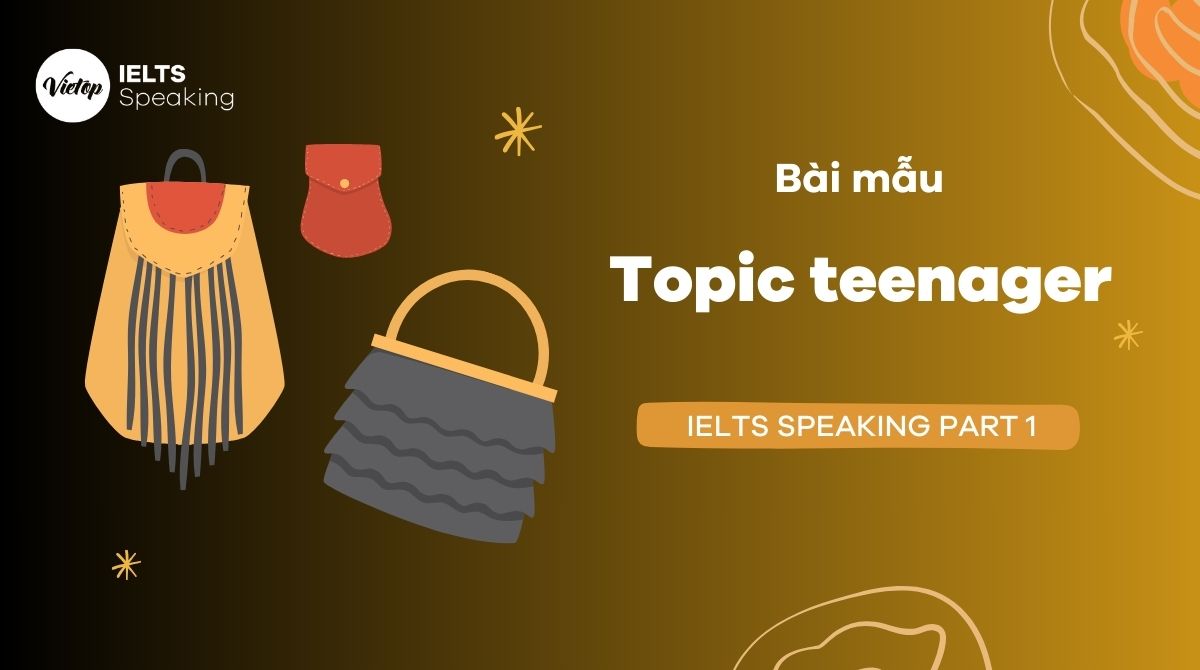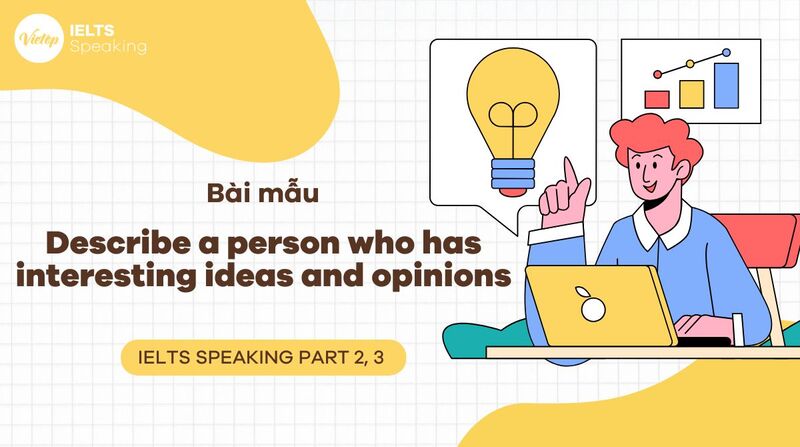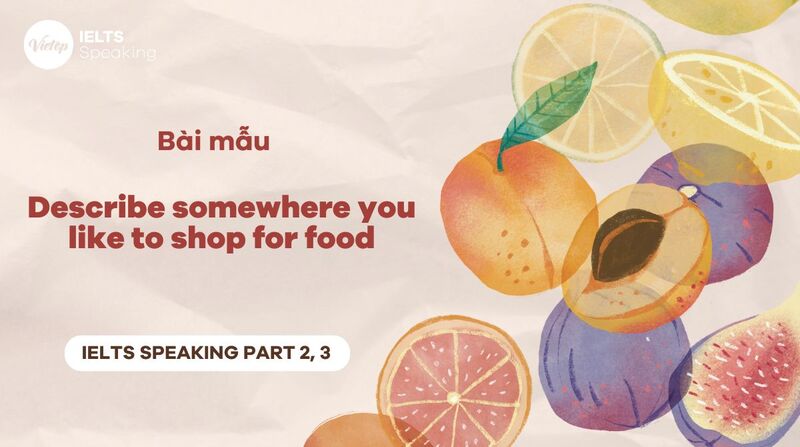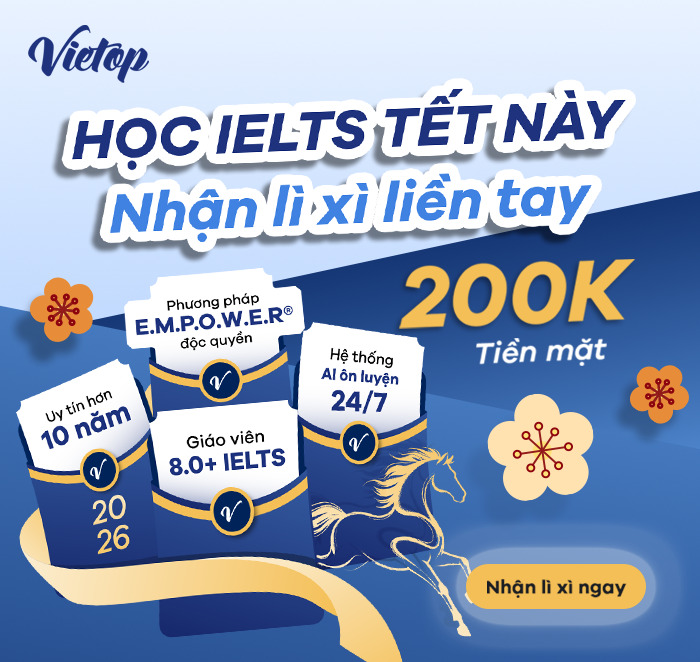Luyện thi Vietop English gửi bạn bài mẫu giải đề Speaking ngày 15/09/2022, cùng tìm hiểu và luyện tập IELTS Speaking thật tốt nhé!
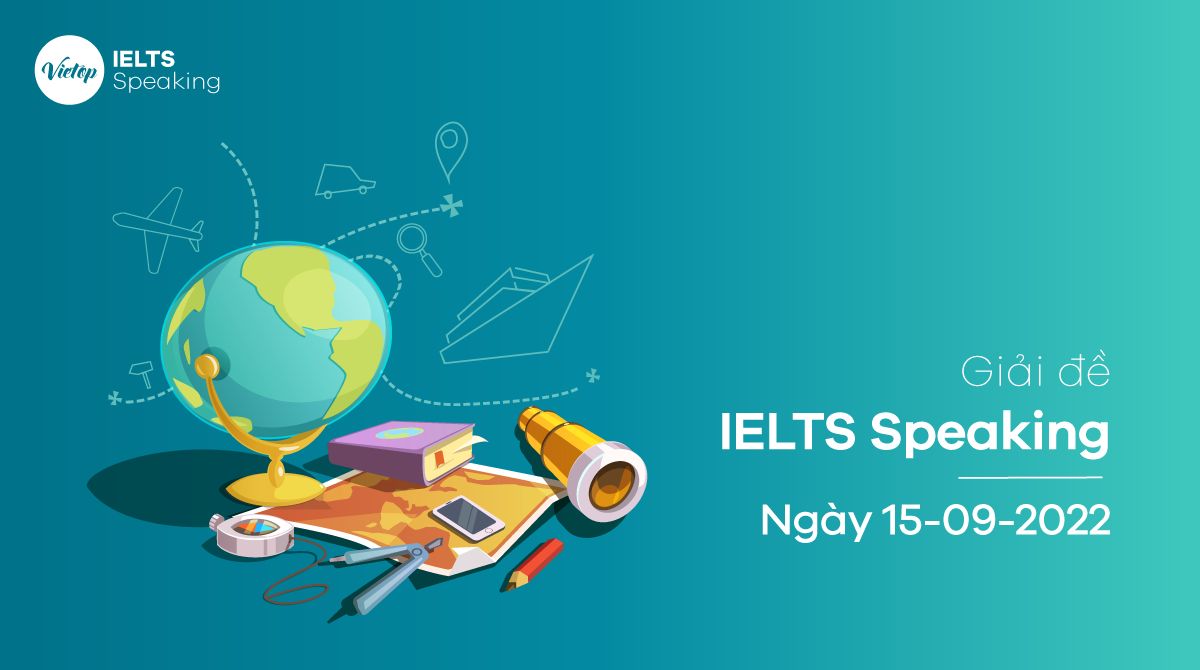
IELTS Speaking Part 1: Geography
Sample
1. Have you ever studied geography at school?
Well in fact, geography is a compulsory subject in Vietnamese curriculum, and students have to encounter the subject since the fourth grade. I guess this is because this is the age when their reading comprehension is adequate and fluent enough so that they could understand a bit more complex sentence structures as well as scientific lexical resources for the subject.
- Compulsory (a): bắt buộc
- Encounter (v): gặp, thường là lần đầu
- Reading comprehension (noun phrase): đọc hiểu
- Adequate and fluent (adjs): đủ/ cân xứng và trôi chảy
- Complex (a): phức tạp
- Lexical resources (noun phrase): nguồn từ vựng
→ Giới thiệu địa lý là môn học bắt buộc trên trường và nêu rõ đã bắt đầu học kiến thức đó từ khi nào. Học sinh có thể phát triển ý nêu lý do bắt buộc phải học môn học này. Bài giải tập trung nêu lý do tại sao lên lớp 4 mới bắt đầu học.
2. Do you like geography?
Well to be honest, I am a huge fan of geography, especially when it comes to space concepts, you know. It is a core chapter in the sixth grade where students have to explore the solar system, the formation of the universe and planets, and things like that. I am so driven by the mysteries related to the origin of life so I couldn’t help it.
In addition to that, I am also quite mad about human geography in which we have to learn about humans and relationships with communities. This helps explain a lot about different aspects of life, such as cultures, politics, histories, and economies.
- Core (a): cốt lõi/ chính yếu
- Driven (a): được thúc đẩy động lực
Bài giải sử dụng mô tuýp miêu tả những điều mình thích và cố gắng liệt kê từ 1-2 ý.
- Ý thứ nhất nói việc thích học về các hành tinh trong môn địa lý
- Ý thứ hai nói về việc học những vấn đề liên quan xã hội trong bộ môn đó
→ Học sinh có thể nêu những điểm yêu thích khác như học cách vẽ và phân tích bản đồ/ học về các quốc gia/ châu lục khác nhau.
Xem ngay: Khóa học IELTS 1 kèm 1 – Chỉ 1 thầy và 1 trò chắc chắn đạt điểm đầu ra
3. Are you good at reading maps?
Well in all fairness, I guess my answer would be determined by different circumstances. You know, if I’m holding a printed map, then it will be helpless because I have no clue about how to figure out the places in the directions given in that kind of map. In fact, my brother taught me a couple of times when we went camping in the past. Eventually, I couldn’t make heads or tails of it.
On the other hand, if I’m using a web mapping platform such as Google Maps, then it will be a piece of cake for me. Practically, with simple access to the Internet you can search for your destination and then the application, and the engine will launch detailed maps with advanced features and functions such as recommendations on transit or traffic, especially during rush hours.
- Have no clue about (idiom): không biết/ không hiểu
- Can’t make heads or tails of it (idiom): không biết/ không hiểu rõ
- A piece of cake (idiom): dễ như ăn cháo
Bài giải sử dụng mô tuýp chia ra hai trường hợp:
- Dạng bản đồ giấy thì không rành
- Nhưng bản đồ trên app thì dễ dùng và có nhiều tính năng hơn
4. Would you visit a country because of its geographical location?
Generally, I guess it’s fairly common for people to travel to a country based on its geographical features. For example, I’ve always wanted to pay a visit to countries in the Southern Hemisphere, such as South Africa or Peru, where we could witness remarkable distinctions of climatic phenomena, seasons, and landscapes.
But you also have to understand that it’s not the only thing. There are other futures worth considering, particularly for people like me who just want to indulge themselves in exquisite explorations of cultures, histories, and cuisines all around the world. You can’t really miss sushi or ramen when coming to Japan, right?
- Distinction (n): sự khác biệt
- Climatic phenomena (n): những hiện tượng thời tiết
Bài giải cũng sử dụng mô tuýp hai trường hợp:
- Có chọn nơi đi du lịch vì các đặc điểm địa lý; học sinh có thể lấy ví dụ hoặc trải nghiệm của bản thân và liệt kê một số điều kiện đặc biệt đáng để viếng thăm
- Còn chọn du lịch vì nhiều yếu tố khác nữa, liệt kê ra những yếu tố đó
Tham khảo:
Describe a place in a village you visited – IELTS Speaking Part 2, 3
Bài mẫu Describe a painting or work of art that you have seen – IELTS Speaking part 2
Audio
IELTS Speaking Part 2
Describe a time when you forgot/missed an appointment
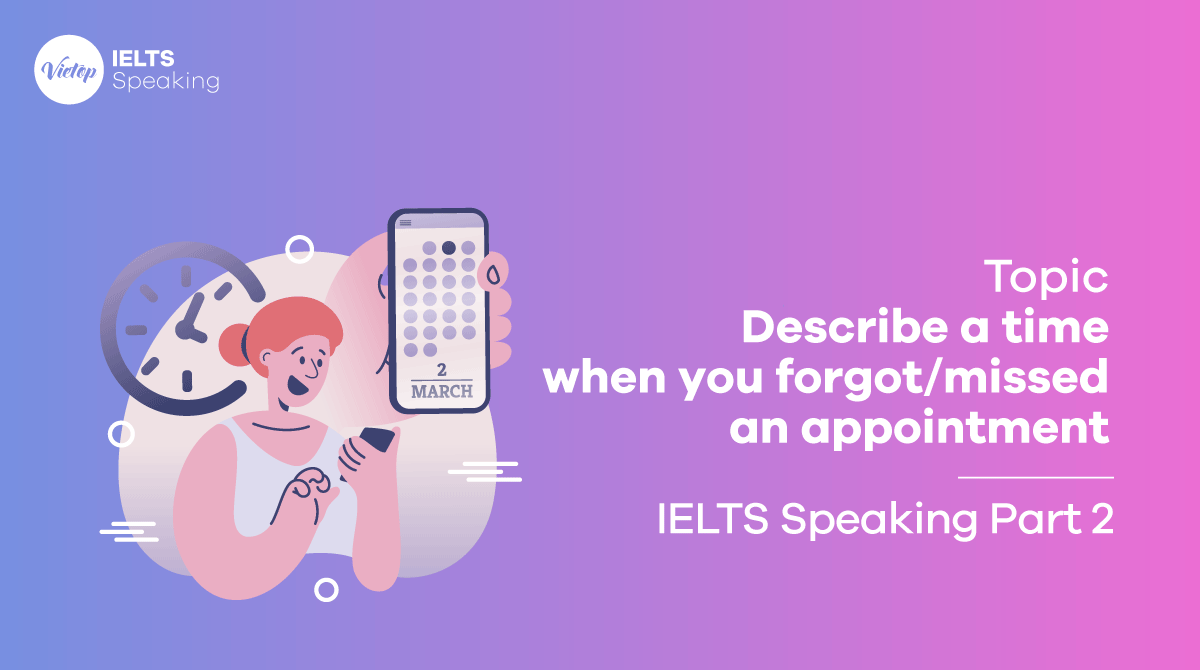
Sample
You should say:
- What the appointment was for
- Who you made it with
- Why you forgot it
- And explain how you felt about the experience.
If there were a competition for the most embarrassing moment I’ve ever had, the time when I missed a meeting with my university tutor would be a strong contender.
If memory serves me correctly, it was in my junior year when I had to write a dissertation about the integrated methodology in linguistics which is also my major. I was supposed to be there by 8 am, and I just realised that I totally forgot about it when the professor called me.
At first, I intended to rush to the campus to see him. Unfortunately, the professor was having classes soon, so he cancelled the appointment. I was ashamed and shattered because I made him who is reputable for his strict rules of punctuality waiting for an hour.
Latter on, I did write an email, quite lengthy one in fact, to apologise him, but I guess he didn’t make a big deal of it because my dissertation turned out to be quite well with flying colours and flattering comments from him
To cut the long story short, it is definitely an unforgettable incident which is a valuable lesson for me when it comes to keeping in mind the arrangements.
Luyện tập IELTS Speaking với bài mẫu IELTS Speaking part 1 và IELTS Speaking part 2 nhé!
- Dissertation (n): bài nghị luận
- Integrated methodology (noun phrase): phương pháp tích hợp
- Linguistics (n): ngôn ngữ học
- Rush (v): vội đi đến
- Ashamed and shattered (adjs): xấu hổ và buồn (tan vỡ trái tim)
- Flying colors (idiom): điểm cao
- Flattering comments (noun phrase): lời khen có cánh
- Incident (n): sự kiện
→ Bài giải miêu tả các nội dung về THỜI ĐIỂM, VỚI AI và SỰ KIỆN diễn ra theo mạch thời gian trước và sau: quên -> quyết định đưa ra sau đó -> kết quả-> cảm xúc đúc kết.
Bài có thể được viết lại theo một tình huống khác, gần gũi hơn với học sinh. Ví dụ một buổi hẹn chuẩn bị bài thuyết trình hoặc tổng duyệt chương trình nào đó. Hoặc đơn giản là buổi hẹn gặp bạn bè. Bài giải có bỏ qua chi tiết nêu lý do tại sao quên. Nhưng học sinh lưu ý, “Bạn nên nói” chứ không là “bạn phải nói”. “Bạn có 2 phút” chứ không là “bạn bắt buộc phải nói đủ 2 phút”. Hãy chuẩn bị bài theo mạch tự nhiên nhất có thể.
Xem thêm:
Bài mẫu The area that you live – IELTS Speaking Part 1
Bài mẫu Describe a special dish in your country – IELTS Speaking Part 2
Audio
IELTS Speaking Part 3: Remembering things
Sample

1. How do people who are busy remember things they need to do?
Well, I guess there are a number of ways for people to keep in mind crucial details, but I guess the most effective way is making notes in their planners or on their phones, and I guess this is because it is the most effective way to remember and keep track of their schedules and arrangements. Besides, they are portable which makes them marvellous tools for quick note taking.
In addition, for those people with brilliant memory, a second method worth mentioning would be memorising or repeating important information a couple of times so as to put it in the back of their mind, and they shall never forget it.
- Keep track of (phrase): theo dõi
- Portable (a): mang theo và di chuyển được
→ Bài giải liệt kê hai cách chính để ghi nhớ: đó là ghi chú (nêu lợi điểm của nó) và học thuộc lòng để ghi nhớ. Học sinh có thể lấy ví dụ của bản thân hoặc người quen để phát triển ý mà không phụ thuộc quá nhiều vào việc giải thích lý do.
2. Do you think people should remember family history?
Honestly, I think there are two main reasons why people, especially young children, should try to learn the history of their own family. First of all, history is memories of the past. It shows what we have been through, like ups and downs. It harbours not only sentimental values but also the sense of belonging for each member of the family.
The second justification is that lessons about the history shape who we are. You know, experience, virtues and moral beliefs will be passed on from generation to generation in the form of stories and commemorations. For example, when I was younger I used to listen to my grandmother’s stories about my grandfather whom I’ve never met, but I know so much of his bravery and dedication to his country when joining the army.
- Ups and downs (idiom): thăng trầm
- Harbour (v): ấp ủ
- Sentimental values (noun phrase): giá trị tình cảm
- Virtue (n): đức hạnh
- Commemoration (n): kỷ niệm/ hoài niệm
→ Bài giải liệt kê 2 lý do chính tại sao nên biết về lịch sử gia đình. Vì lịch sử là hiện thân của hồi ức và các sự kiện trong quá khứ và vì những giá trị học được từ nó. Ví dụ về những điều mình học được qua những mẩu truyện được kể về gia đình.
3. What do you think of people using calendars to remind themselves of things?
Well based on my experience and subjective viewpoint, there are two main personality traits that could be interpreted from those who make a habit of taking notes of important events on calendars.
First of all, he or she is definitely a typical family person who would spend a lot of time at home taking care of others. Taking my mum as an example, she spends most of the time in the kitchen cooking things for us, you know, so she always keeps a calendar on the wall to keep track of dates and things.
The second characteristic would have something to do with their age. Most people who are no spring chicken anymore would prefer writing things down on their calendars while youngsters, nowadays, would be keen on noting on the phones or in the planners.
- Interpreted (a) giải thích/ diễn tả
- A typical family person (phrase) người mô tuýp gia đình điển hình
- No spring chicken (idiom) không còn trẻ/ đã lớn tuổi
→ Câu hỏi yêu cầu nêu suy nghĩ về những người ghi nhớ thông tin bằng lịch. Học sinh có thể chọn hai đặc điểm tính cách có liên quan để miêu tả ví dụ như cẩn trọng, tỉ mỉ, chu đáo … Bài giải nêu đặc điểm liên kết về tuổi tác và người có khuynh hướng xem trọng và chăm lo cho gia đình.
Xem ngay:
Bài mẫu Topic Culture – IELTS Speaking Part 1, 2, 3
Bài mẫu Topic Customer service: IELTS Speaking (Full 3 part)
Audio
Trên đây là giải đề Speaking ngày 15/09/2022, hy vọng đã giúp bạn có nhiều từ vựng và ý tưởng hơn để triển khai trong phần thi của mình nhé! Và nếu đang luyện thi IELTS thì hãy liên hệ với Vietop để được tư vấn nếu học mãi mà vẫn chưa nâng điểm được nhé.

